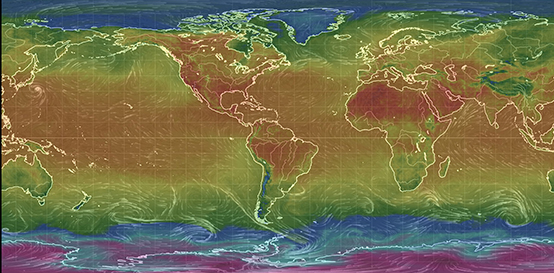
Global temperatures on the rise (Photo: earth.nullschool.net/CC)
How can breaking records become normal? It seems like a contradiction. Yet, every year, the summers are hotter than anyone can remember, and there are more catastrophic natural disasters and extreme weather events.
The heat wave in Asia has already killed over one hundred between Japan and South Korea. The fires in California show no signs of subsiding (there’s even a new term: fire tornado), and farmers in Britain are unsure of how they will adapt to the changing seasons and water shortages.
Adaptation to climate change is often discussed as the only option going forward. Reducing carbon emissions enough to stop climate change, although concerted efforts are being made, seems almost futile. The 2-degree mark that frightened the world into signing the Paris Climate Agreement, seems like an inevitability even if countries do stay on target (with the US pulling out, the pact is evermore symbolic.)
It is now predicted that by the end of the century, the earth will reach warming of 4 degrees above pre-industrial levels, potentially leading to runaway warming, or what the Guardian referred to as the “hothouse” effect. Humans have always been comparatively adaptable, able to live in a variety of conditions and temperatures. According to science journalist, Bob McDonald, few people realize that 5 degrees were the difference between today’s temperatures and those of the last ice age.
How would countries adapt to an overall hotter climate? How many residents of coastal cities would have to be moved inland? Where would island refugees go? How many more subsidies will farmers need to cope with ever-changing growing seasons?
The UK Government recently published its climate change adaptation strategy for 2018-2023, put out by the Committee on Climate Change (CCC). It includes a plan for financial regulators to report on adaptation, a voluntary reporting process about climate exposure for large businesses and pension funds, and mentioned altering building codes to deal with heat retention, as, “the number of premature heat-related deaths is expected to more than triple by the 2050s.”
Some on the committee were not satisfied with the report, stating that it did not go far enough, and seemed more like a laundry list of concerns rather than a detailed, time-bound plan to tackle specific issues relating to climate change adaptation, including some deemed dire by the committee itself.
When the ‘human nature’ aspect of how we will cope with these major changes in the chemistry of the atmosphere and subsequent way of life, are analysed, many people sound pessimistic. Until it is widely understood that a complete change in the system and our places within it have to be altered in order to tackle climate change, it will not happen. As long as solutions are viewed as short-term fixes before we can return to our old wasteful habits and inefficient ways, the planet will continue to warm, and extreme weather events will continue to plague large swathes of the global population.
The New York Times Magazine recently published a 66-page issue dedicated to one story – that of the decade that humans could have stopped climate change, but didn’t. The author, Nathaniel Rich, exposes how, between 1979-1989, there was a clear understanding of the science behind climate change, and that it was not a partisan issue in the US businesses and governments alike were ready to tackle the issue, but the scepticism of a few in power overcame the will to act decisively. From then on, the interests of polluting industries have had a disproportionate amount of power in the decisions around energy policy.
Climate change is repeatedly polled as a more dire concern than terrorism. People from all walks of life feel its effects. This summer has been a prime example. When people in developed countries prematurely die due to extreme heat, people know things have reached a more frightening level. Unfortunately, it will take extreme events to show just how drastically our adaptation efforts will need to be to cope with “the new normal” of changing seasons, hotter summers, warmer winters, and harsher weather events. Coastal cities will need to move inland and residents may find their spaces a bit more cramped, as people become climate refugees. These coming decades will be the true test of human innovation, the resilience of the human spirit, or will expose the pressure under which it will buckle.
Sarah Sakeena Marshall, English Language Teacher, Environmental Columnist